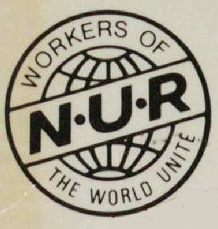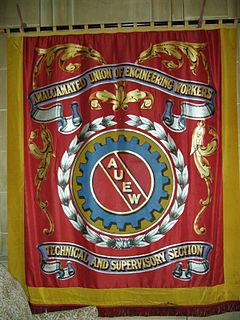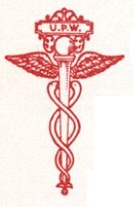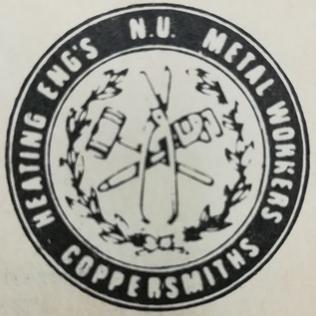In British politics, an affiliated trade union is one that is linked to the Labour Party. The party was created by the trade unions and socialist societies in 1900 as the Labour Representation Committee and the unions have retained close institutional links with it.

The Bakers, Food and Allied Workers' Union (BFAWU) is a trade union in the United Kingdom. Founded in 1847 in Manchester, it represents workers in the food industry.

The National Union of Railwaymen was a trade union of railway workers in the United Kingdom. The largest railway workers' union in the country, it was influential in the national trade union movement.

The Ceramic and Allied Trades Union (CATU) was a trade union representing pottery workers in the United Kingdom.

The Technical, Administrative and Supervisory Section (TASS) was a British trade union.

The Union of Communication Workers (UCW) was a trade union in the United Kingdom for workers in the post office and telecommunications industries.

The Modern Records Centre (MRC) is the specialist archive service of the University of Warwick in Coventry, England, located adjacent to the Central Campus Library. It was established in October 1973 and holds the world's largest archive collection on British industrial relations, as well as archives relating to many other aspects of British social, political and economic history.

The Amalgamated Engineering Union (AEU) was a major British trade union. It merged with the Electrical, Electronic, Telecommunications and Plumbing Union to form the Amalgamated Engineering and Electrical Union in 1992.
The National Association of Operative Plasterers (NAOP) was a trade union representing plasterers in the United Kingdom.

The National Union of Vehicle Builders (NUVB) was a trade union in the United Kingdom. The NUVB represented a mixture of skilled and unskilled workers in the automotive industry.
The London Society of Compositors was a British trade union, representing print workers in London.

The Amalgamated Society of Boilermakers, Shipwrights, Blacksmiths and Structural Workers (ASB) was a trade union in the United Kingdom. Many of its members worked in shipbuilding, in which industry it was the leading trade union, while over time it also developed strength in engineering and construction.

The National Union of Tailors and Garment Workers (NUTGW) was a trade union in the United Kingdom.

The Amalgamated Union of Building Trade Workers (AUBTW) was a British trade union.

The Furniture, Timber and Allied Trades Union (FTAT) was a trade union in the United Kingdom.

The National Union of Sheet Metal Workers, Coppersmiths, Heating and Domestic Engineers was a trade union in the United Kingdom and Ireland.
The National Union of the Footwear, Leather and Allied Trades (NUFLAT) was a trade union in the United Kingdom which existed between 1971 and 1991. It represented workers in the leather and footwear industry.

The National Union of Boot and Shoe Operatives (NUBSO) was a trade union in the United Kingdom which existed between 1873 and 1971. It represented workers in the footwear industry.
The Amalgamated Society of Painters and Decorators (ASPD) was a trade union in the United Kingdom which existed between 1886 and 1970.
The General Council of the Trades Union Congress is an elected body which is responsible for carrying out the policies agreed at the annual British Trade Union Congresses (TUC).














